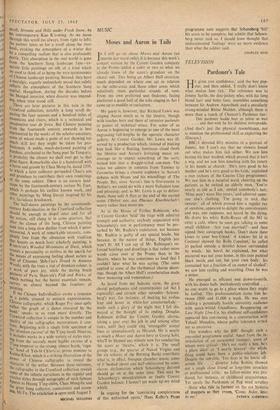TELEVISION
Pardoner's Tale
E gives you confidence,' said the boy pop- 11. star, and then added, 'I really don't know what makes him tick.' The reference was to Jimmy Savile, the disc-jockey who, with his long blond hair and bony face, resembles something between Sir Andrew Aguecheek and a peculiarly strong-minded Rhine Maiden, although there is more than a touch of Chaucer's Pardoner too:
This pardoner hadde heer as yelow as wax . . . and ther-with he his shuldres overspradde. (And that's just the physical resemblance, not to mention the professional skill at exploiting the illiterate.)
BBC-1 devoted fifty minutes to a portrait of Jimmy, but 1 can't say that we viewers found out what makes him tick either. We saw him having his hair washed, which proved that it isn't a wig, and we saw him kneeling with his rosary in his hands at church: 'He's very good to his mother and he's very good to his faith,' explained a nun (echoes of the Cassius Clay programme). We saw him in a hospital ward, cheering up the patients as he twitted an elderly man, 'You're -nearly as old as I am,' envied somebody's hair, 'Mine won't wave like yours,' and admired some- one else's clothing, 'I'm going to nick that sweater,' all of which proved him a regular ray of sunshine, appeared to delight the convalescents and was, one supposes, not heard by the dying. He drove his white Rolls-Royce off the MI to enter a café, where he soon got talking to some small children--'Are you married?'—and then signed their autograph books, 'Don't show these kisses to your boy-friend.' A kinkier bit (zi la Cocteau) showed the Rolls ('opulent,' he called it) parked outside a derelict house surrounded by weeds: his hovel, he explained, but what mattered was not your house, in this case painted black inside and out, but your own body: his contained 'not a fraction of an ounce of alcohol'; we saw him cycling and wrestling. Once he was a miner.
He emerged as efficient and down-to-earth, with his dance halls 'meticulously controlled . . . no one wants to go to a place where they might be knifed.' This professionalism earns him be- tween £800 and £1,000 a week. He was seen holding a potentially hostile university audience with quick-witted friendliness. Reappearing on Late Night Line-Up, his ebullient self-confidence appeared less convincing in a conversation with Yehudi Menuhin, whose polite tolerance struck me as excessive.
One wonders why the BBC thought such a one-sided programme useful. Apart from the in- terpolation of an occasional teenager, some of whom were critical—'He's not really a boy, he's a plain idiot' or 'I nearly heaved'--the whole thing could have been a public-relations job. Despite the sub-title, Ten days in the hectic off- screen life . . .,' director John Robins showed not a single close friend or long-time associate or professional critic: no fellow-miner was pro- duced, for instance, or childhood acquaintance. Yet surely the Pardoners of Pop need scrutiny --those who ride to fortune on the sex hysteria of moppets as they croon, 'Come, hider, love,














































 Previous page
Previous page